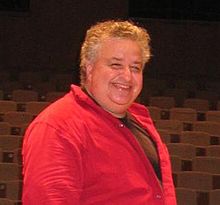Lior Shambadal
Lior Shambadal ( Hebrew ליאור שמבדל; * May 14, 1950 in Tel Aviv ) is an Israeli conductor and composer .
Education
Lior Shambadal studied viola , trombone , composition and conducting in his native Tel Aviv, then in Salzburg at the Mozarteum and in Vienna . He studied conducting with Carlo Maria Giulini , Igor Markevitch , Sergiu Celibidache and Franco Ferrara . Shambadal completed his studies in electronic music in Vienna and composition in France with Witold Lutosławski .
Professional and social activity
As a conductor
Lior Shambadal has extensive concert activities with orchestras in Israel and Europe. From 1980 he was chief conductor of the Haifa Symphony Orchestra and from 1986 to 1993 director of the Kibbutz Chamber Orchestra in Tel Aviv; with him he made numerous tours through Europe. From 1993 until the end of the 1999/2000 season he was general music director of the Pfalztheater Kaiserslautern ; there he played a key role in the opening of the new theater. He was also chief conductor of the Berliner Symphoniker from 1997 to 2019 , from 2000 to 2003 also chief conductor of the Radio Symphony Orchestra RTV-Slovenia Ljubljana (Slovenia), from 2008 to 2011 director of the Orquestra Filarmónica di Bogota (Colombia), from 2008 to 2010 principal guest conductor of the Liepaja Symphony Orchestra (Latvia) and also first guest conductor of the Chengdu Symphony Orchestra of the Central Conservatory of Sichuan (China).
Lior Shambadal is well known internationally through his guest conducting as well as through CD and television productions.
As a composer
Shambadal is the founder of the ensemble of the composer group Acustic 7/11 and the ensemble for new music . As such, he has also emerged as a composer in various fields - from chamber music to song compositions to symphonic works.
Contexts
Shambadal defines his professional activities as social tasks. In an interview with the left-wing daily Junge Welt , he emphatically supported the fact that artists and their institutes had “a political responsibility”. “Not in the sense of day-to-day politics, but to show society a direction.” Art must “warn of a threat to humanity, as Heinrich Heine once did.” In this context, he noted “structural changes” and for the present This is accompanied by a growing "anti-Semitism in Germany and in Europe". That is why he supports Magret Wolf's current opera project , which is "a strong piece against anti-Semitism", and is working on it, while he considers a concert to be "irresponsible" for Siegfried Wagner . "Tolerance and acceptance of other forms of life" has changed in Germany. There is now “an uncomfortable atmosphere”, but he is looking forward to his tour in China. He “believe in music”.
Discography (selection)
- Niccolò Paganini : Concerts for Violin and Orchestra I - VI. Ae-Kyung Song-Krist, Mechernich 2007
- Piano concertos. Ae-Kyung Song-Krist, Mechernich 2005
- The whole world of classical music. Universal Music, Berlin 2005
- Astor Piazzolla : Adios Noniño. Koch Universal, Planegg [2004]
- Magret Wolf : Kirisk. BMG Ariola, Munich [u. a.] [2003]
- Double concertos. BMG Ariola, Munich [u. a.] [2002]
- Elena Zaremba - portrait. BMG Ariola, Hamburg / Munich [2001]
- The most beautiful classic to dream. Koch International, Munich [2001]
- Robert Schumann : Overtures. BMG Ariola, Hamburg / Munich [2001]
- Rhapsody for Klezmer . Koch International, Munich [2000]
- And the angels sing. Koch International, Munich [1999]
- Giora Feidman plays Bloch, Olivero, Ora Bat Chaim. Koch International, Munich [1997]
- Trombone concertos. Claves-Verlag, Thun / Helikon Harmonia Mundi, Eppelheim, sales [1996]
- Franz Hummel : Gesualdo. BMG Ariola, Hamburg / Munich [1996]
- Violin concertos. Claves-Verlag, Thun / Helikon-Musikverlag, Heidelberg, distribution [1993]
- Return to the south. Network Media Cooperative, Frankfurt (Main) [1992]
Web links
- Works by and about Lior Shambadal in the catalog of the German National Library
- Lior Shambadal ( memento of March 8, 2017 in the Internet Archive ) on www.kammermusiktage-ahrenshoop.de
swell
- ↑ “I encounter anti-Semitism at every turn.” Conversation with Lior Shambadal. About the Berliner Symphoniker, political responsibility for artists and the future of Jews in Germany. In: young world . May 18, 2019, accessed July 14, 2019 .
| personal data | |
|---|---|
| SURNAME | Shambadal, Lior |
| ALTERNATIVE NAMES | ליאור שמבדל (Hebrew) |
| BRIEF DESCRIPTION | Israeli conductor |
| DATE OF BIRTH | May 14, 1950 |
| PLACE OF BIRTH | Tel Aviv |
